Global South

“GOD CREATED the world and we created borders.”
That obvious recognition was shared at a recent consultation in Quito, Ecuador, between North American and Latin American churches on “Faith, Economy, and Migration.” Felipe Adolf, president of the Latin American Council of Churches, shared that conclusion on how issues of migration and reform are global and not just local.
It’s very easy to see the problems confronting our nation and feel as though the challenges facing the rest of the world are simply too much to bear. Continuing poverty and unemployment, discrimination of all kinds, and wars and rumors of wars fill our newsfeeds, papers, and TV screens. But it’s naïve and narrow to think this way. Many of the threats we face are global in nature and don’t know any boundaries. Through our economies and consumption habits, media, travels and migrations, and for Christians in particular our faith, we are inextricably connected with men and women around the world. It’s always been important, but now especially so, to think globally when it comes to faith and justice.
Sojourners has a long history of doing this very thing. We started as a little group of two kinds of people—those who had grown up conservative evangelicals and were deeply frustrated with the lack of attention to issues of justice and peace, and those who had just come to faith from the student movements and counterculture of the 1960s and ’70s. We met at Trinity Evangelical Divinity School and began to study and pray through the scriptures about injustice, war, and poverty. The Vietnam War was raging, and we were looking for a biblical understanding of the events of our time.

In naming his first batch of new cardinals on Sunday, Pope Francis made some surprising choices that largely confirmed the characteristics he wants in the Catholic Church he leads: a greater focus on the poor, a bigger voice for the Global South and a reduced emphasis on the traditional hierarchical perks.
True to form, Francis wrote each of the new cardinals and stressed that the new title “does not imply promotion.” He asked them to refrain “from any expression of worldliness or from any form of celebration contrary to the evangelical spirit of austerity, sobriety and poverty.”
Some had expected Francis to leave his mark by pushing well beyond the ceiling of 120 cardinals under the age of 80 who are eligible to vote in a conclave.
Spirit Connections
Some Western and global South churches have established “sister church” relationships as a more mutual alternative to the old mission field approach. Drawing on fieldwork and interviews, Janel Kragt Bakker studies the give and take of this model in Sister Churches: American Congregations and Their Partners Abroad. Oxford
Border Clashes
The documentary The State of Arizona captures multiple perspectives on undocumented immigration in the aftermath of Arizona’s controversial Senate Bill 1070, dubbed the “show me your papers” law. Directed by Catherine Tambini and Carlos Sandoval, it will premiere on PBS’s Independent Lens series on January 14 (check local listings). communitycinema.org
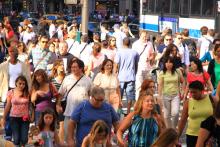
In the age of the internet, we have access to a vast quantity of information beyond our dreams even twenty years ago. Most of the time, I use this power to look at LOLCats and Buzzfeed articles like "11 Signs You Might be Dating a Pirate."
But as a Christian who feels the weight of caring for the people Jesus called "the least of these," I feel a responsibility to be educated about the plight of the billions of people who live on less than $2 per day around the world (and here in the US, as recently evidenced by the cuts to food stamp programs).
Caring for the poor directly in our neighborhoods is essential to the mission of the local church, and universally, it is the Church’s responsibility to care for the poor in every corner of the planet.
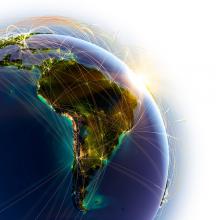
A global leader in ecumenical movement has alerted participants to the forthcoming World Council of Churches 10th Assembly in Busan, to be aware that they meet in rapidly changing times for world Christianity.
He says there are consequences for all church institutions, including the WCC itself.
Rev. Wesley Granberg-Michaelson, in a book timed to coincide with the gathering, says so fundamental are the changes now shaping the Christian world that the WCC will need to "commit to deep change."
It they don't, he says, they could remain largely isolated from the dynamic and growing parts of the church, especially from the global South.
His perceptions are likely to strike a chord at when the World Council of Churches meets in Busan from Oct.30 to Nov. 8 for its 10th Assembly, the highest decision making body of the grouping that represents some 560 million Christians.
Granberg-Michaelson, is a former member of the main governing body of the WCC, its central committee, and worked on the staff of the organization for six years, originally as director of the Church and Society programme.
He says the book, From Times Square to Timbuktu, is an attempt to describe the "growing gulf" occurring in world Christianity, primarily between the burgeoning Pentecostal and evangelical churches in the global South and the declining churches of the global North.
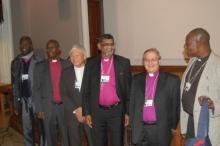
Primates and bishops from the Global South attending a gathering in Toronto, said current proposals for a new Anglican Communion covenant don’t go far enough to heal the conflict in the communion over homosexuality.
The Wednesday gathering to mark the 50th anniversary of the Toronto Anglican Congress, suggested the worldwide Anglican Communion faces troubled waters. Anglicans from the Global South prepare to meet for their second Global Anglican Future Conference next month and the Toronto meeting showed no signs of reconciliation.
Archbishop Ian Ernest, primate of the province of the Indian Ocean, said decisions by the Episcopal Church in the United States and the Anglican Church of Canada on issues involving homosexuality have torn the fabric of communion.
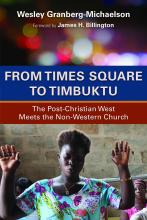
High-octane contemporary worship with smoke, flashing lights, and words on huge screens energize and empower 3,400 Pentecostals from 69 countries filling the Calvary Convention Centre in Kuala Lumpur, Malaysia,. This is the 23rd Pentecostal World Conference, a triennial gathering of pastors, leaders, and youth from around the globe. I’m here as part of a delegation from the Global Christian Forum, warmly invited, seated right in the front, and including representatives from the Lutheran, Orthodox, Seventh-Day Adventist, Mennonite, African-Instituted and Reformed church bodies, all members of the GCF steering committee. We’re easy to pick out of the crowd, since we’re the only ones who don’t spontaneously raise our hands in worship. I hope that image doesn’t make it to the big screens.
The explosive growth of Pentecostalism is an astonishing chapter in the story of world Christianity’s modern history. In 1970, Pentecostals (including charismatics in non-Pentecostal denominations) totaled about 62 million, or 5 percent of the total Christian population. In the four decades since, Pentecostals have grown at 4 times the rate of overall Christianity, and 4 times faster than the world’s population growth. Today they number about 600 million — one out of every four Christians in the world, and one out of every 12 people alive today. Most of this growth has come in the global South, in places like Africa, South America, and — yes — Malaysia.
The Pentecostal World Conference doesn’t look much like a typical denominational or ecumenical assembly. It’s more like a global revival service. Several of the world’s best-known Pentecostal preachers and leaders deliver stirring messages, complete with altar calls for those seeking the fresh empowerment of God’s Spirit in their lives and ministries. It’s a far cry from a Reformed Church in America General Synod, which I facilitated for many years. But these keynote speakers, along with the workshops held each day of the conference, open a window into global Pentecostalism’s present trends, challenges, and directions.
In writing From Times Square to Timbuktu: The Post-Christian West Meets the Non-Western Church, I found that one of the most intriguing questions I encountered is how rapidly growing forms of Christianity in the global South deal with social and economic issues within their societies. So in Kuala Lumpur, I was especially attentive to what might be said by the world’s Pentecostal leadership about the biblical call to justice and mercy. And I heard a lot that I wish I could now go back and add to my book.
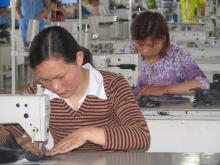
THE APRIL 24 collapse of a garment factory near Dhaka, Bangladesh, killed more than 1,125 people. That tragedy followed a fire that killed 112 last November at a factory making goods for companies including Walmart. According to the International Labor Rights Forum, at least 1,800 garment workers in Bangladesh have died in fires or other factory disasters since 2005. The collapse near Dhaka is the largest disaster in that time and the one that has gotten global attention.
As a Dominican Catholic sister and member of Catholic Scholars for Worker Justice, I approach reflection on such a disaster from the foundation of Catholic social teaching. Each of the social principles below relates to the situation in Bangladesh and challenges us to reflect on our own regard for those who provide our clothing.
- Life and dignity of the human person. Story after story of the people who work in the garment industry shows the lack of respect for workers. Long hours, few to no breaks, prevalent verbal, physical, and sexual abuse, and now the collapse of a factory—do we need any more proof that human life is held in so little regard? Many years ago, Cardinal Joseph Bernardin called for an understanding of “respect life” as inclusive of human life “from womb to tomb.” Our upholding of life must include working toward changing factory conditions so that a debacle such as Dhaka never happens again.
VATICAN CITY — Gains in Asia and Africa are making up for losses in Europe among the world’s 1.2 billion Catholics, according to Vatican statistics released Monday, signaling a shift of the church’s center of gravity toward the Global South that was heralded by the election of the first Latin American pope.
Data published in the 2013 Statistical Yearbook of the Church also show that while the number of priests in the Americas and in Europe is declining compared to the overall Catholic population, those losses were offset by increasing ranks of permanent deacons.
There are now about 41,000 permanent deacons worldwide, a 40 percent increase over the past decade. The vast majority of them — 97.4 percent — live in the Americas or in Europe.
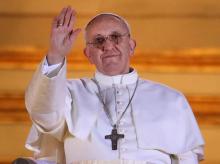
Francis. Pope Francis. This could be good news for the Catholic Church, for the whole church, and for the world. Let’s hope and pray so.
Jorge Bergoglio, the Argentinian cardinal from Buenos Aires, will be the first pope from Latin America and the first outside of Europe in a millennium. That’s good news from the start. And the world is now learning about the 76-year-old new pontiff whose election caused the white smoke to rise in the night skies of Rome to the cheers of tens of thousands of people in St. Peter’s Square. A Jesuit scholar, he seems to be a humble man who lives simply, choosing to live in a small apartment instead of the archbishop’s palace, and travel on buses and trams instead of in the church limousine.
Will simplicity and social justice become the witness of the Roman Catholic Church around the world — and will it emanate from the first pope from the Global South, which is clearly the growing future of the church? What good news that would be.

As the 117 Roman Catholic cardinals walk into the Sistine Chapel next month for the election of a new pope, one hopes that they fully recognize the unfolding, dramatic pilgrimage of world Christianity: The demographic center of Christian faith has moved decisively to the Global South.
Over the past century, this astonishing demographic shift is the most dramatic geographical change that has happened in 2,000 years of Christian history. Trends in the Catholic Church — comprising about 1 out of 2 Christians in the world — have generally followed this global pattern:
- In 1900, about 2 million of the world’s Catholic faithful lived in Africa; by 2010, this had grown to 177 million.
- 11 million Catholics were found in Asia in 1900; by 2010 there were 137 million Asian Catholics.
- Through colonial expansion, 59 million Catholics populated Latin America and the Caribbean in 1900; but by 2010, that number had grown to 483 million.
- In 1900, two-thirds of the world’s Catholic believers were in Europe and North America; today, two-thirds are in Latin America, Africa, and Asia.
IN APRIL, THE World Bank’s executive directors selected Dr. Jim Yong Kim to serve as its president. Kim, whose five-year term begins in July, will be the first World Bank president whose primary experience is in community-level development. Most of his predecessors were bankers or politicians.
As a co-founder of Partners in Health, an international nonprofit dedicated to “a preferential option for the poor in health care,” and as a former director of the HIV/AIDS department of the World Health Organization, Kim has done groundbreaking work in delivering essential medicines for the treatment of AIDS to impoverished countries. He has a proven capacity for designing effective solutions to real problems. His election may well usher in a new culture at the World Bank—a culture that focuses not on economic growth that doesn’t trickle down, but on poverty reduction that is real.
For almost 70 years, the World Bank and the International Monetary Fund (IMF) have been major players in the global economy; the World Bank has 188 member countries, all of which must first be admitted to the IMF. In their many years of doing business, these institutions have reinvented themselves more than once. The World Bank’s focus has evolved from rebuilding Europe and Japan following World War II to supporting large-scale engineering projects in so-called “developing” countries; from emphasizing nutrition, population, and poverty in the 1970s to “adjusting” the economic policies of countries in the global South, beginning in the early 1980s.
As the negative impact of IMF policies and World Bank projects on impoverished people and their communities became increasingly evident, people of faith and grassroots groups around the world, particularly in the global South, began demanding change. They organized and advocated for greater transparency, accountability, and participation, insisting that failed strategies promoted and financed by the IMF and World Bank were related to hunger and other poverty-related problems, a growing rich-poor gap in almost every country, and environmental destruction.
People of faith -- including evangelical Christians -- will be voting both ways in the upcoming election. It is simply not true that they will be voting only on one or two issues.
And, if evangelicals focus on many of the issues central to their faith, rather than becoming partisan cheerleaders, they might be able to raise some critical issues in this election and to hold both sides more accountable, even in a campaign that both Richard and I suspect will be one of the ugliest in U.S. history.
At the end of the evening, Amy remarked that if the upcoming election debates were as civil and substantive as this evening was, we would all be very grateful.
If justice is only an implication, it can easily become optional and, especially in privileged churches, non-existent. In the New Testament, conversion happens in two movements: Repentance and following. Belief and obedience. Salvation and justice. Faith and discipleship.
Atonement-only theology and its churches are in most serious jeopardy of missing the vision of justice at the heart of the kingdom of God. The atonement-only gospel is simply too small, too narrow, too bifurcated, and ultimately too private.
The compelling story of the Global Christian Forum, shared with the more than 300 forum attendees (many of them new), was told in moving testimonies from Orthodox, Pentecostal, Evangelical, Catholic, and historic Protestant members of the forum's steering committee. ... It's remarkable to hear how an Egyptian surgeon became a Coptic Orthodox priest, or how a woman Anglican Bishop from New Zeland heard her calling to the priesthood as a teenager, long before her church ordained women. Story after story simply puts you in awe of God's grace.
The Global Christian Forum is the most exciting and promising ecumenical initiative I've participated in all my years of ministry. Its import can be summed up simply: This is the only place where the leadership of evangelical, Pentecostal, Catholic, historic Protestant and Orthodox churches -- which comprise all the major "families" of world Christianity -- are brought into sustained and intentional fellowship. In so doing, the Global Christian Forum is also responding to the dramatic shift of the center of Christianity from the North and West to the southern hemisphere.
Where has all the sanity gone?
I, for one, never expected in my wildest dreams to pine for the days of Ronald Reagan. But I'm there.
And for everyone who is blaming "everyone" on this debt ceiling debacle, you're just dead wrong. The Democratically controlled House and Senate in the 80s did not hold President Reagan hostage when he had to raise the debt ceiling. And that is exactly what is happening. And the problem is that this is a train wreck that has been months in the coming. The only thing that we don't know is how bad the carnage will be.